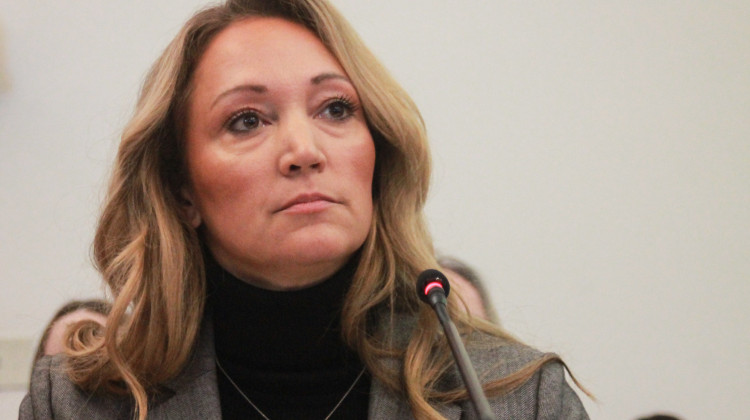
Purdue University's Kimber Nicoletti-Martinez was recognized as the National Social Worker of the Year Award by the National Association of Social Workers.
Photo provided by Kimber Nicoletti-MartinezAn Indiana social worker recently received the National Social Worker of the Year Award from the National Association of Social Workers. Purdue University's Kimber Nicoletti-Martinez was recognized for developing a statewide program to prevent sexual violence in under-served and marginalized communities with an emphasis including farm workers. Indiana Public Broadcasting’s Jill Sheridan spoke with Nicoletti-Martinez who is the director of the statewide program "Multicultural Efforts to End Sexual Assault," or MESA.
Sheridan: Tell us where your work started, when you realized there is a great need for this in Indiana and I have to do this.
Nicoletti-Martinez: Well my work actually started with my academic advisor at Purdue University, I’m a Purdue alum. I was a single mother and I had three daughters and I’m a survivor of child sexual abuse. I was always wanting to make a difference in the world and I worked as a farm worker as a child and have a passion for farm worker communities. To me it was a natural fit when I came to Purdue to work with CARE, communities against rape initiative, that we start doing outreach with farm worker communities.
Sheridan: And you actually created the first farm worker child sexual abuse prevention program, what did that look like and how did you come up with that idea?
Nicoletti-Martinez: Well that was built upon work that I started with CARE where we were doing sexual violence prevention work. I actually had heard some stories along the way where people had disclosed some things to me. They said ‘Kimber, we’re having some problems with our daughter and she cries every night at dinner.’ They family thought it was a behavioral issue but to me it looked like possible symptoms of a child who was being abused.
Sheridan: Obviously, you are passionate about working with those that are under-represented. Is there a great need for that here in Indiana?
Nicoletti-Martinez: There is a great need for that in Indiana and the thing is for a lot of people in these communities, they’re not able to get their needs met by going through mainstream efforts or services aren’t available that are culturally appropriate for those communities.
For a lot of marginalized communities, for example when I started working with the farm worker community, people were surprised to find out there were migrant farm workers in Indiana.
Sheridan: Children here in Indiana, in families in these populations, what are the risks that some of these children are facing?
Nicoletti-Martinez: In a recent study, 90 percent of farm worker women say that they face sexual harassment in the field. Sexual harassment ranges from any kind of behavior from lewd name calling to actual rape. And because of labor laws regarding you know seasonal and farm work, you often have underage people, under employment law they might say they’re a victim of sexual harassment when in reality it’s a child who has been sexually assaulted.
Risk factors for child sexual abuse has to do with income, female headed households, limited English capacity, a lot of the same risk factors for sexual violence.
Sheridan: Your work as a social worker, I want to talk about that broadly, I think there is a greater understanding of the need for social workers.
Nicoletti-Martinez: Really social work, looks at empowering and advocating for people, regardless of the setting so it can be in a school based setting, it can be in a medical setting. It’s really about providing unconditional, positive regard for humans, for people and at the same time creating access and social justice for people.
Sheridan: Your program here, we’re at Purdue University, first campus based violence prevention program for people who are LGBTQ, bilingual, bicultural… what success has that program had and what’s that look like here?
Nicoletti-Martinez: Really looking at a primary prevention approach and looking at how is gender based, where does it start? And so it starts in institutions, and so if we can create institutions that embrace people as well as addressing the more personal level of violence of violence prevention which comes at the interpersonal level.
 DONATE
DONATE









 Support WFYI. We can't do it without you.
Support WFYI. We can't do it without you.